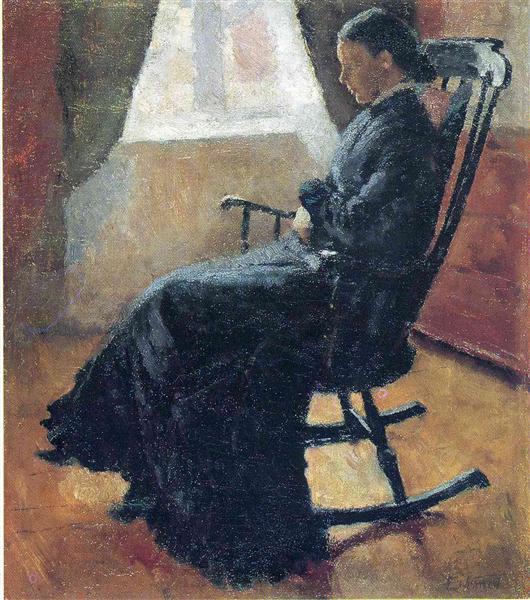Description
The work "Aunt Karen in the rocking chair" by Edvard Munch, made in 1883, is a fascinating example of the artist's expressionist approach, although in an still moderate period compared to his later career. In this painting, Munch portrays his aunt Karen, who was a significant figure in his life, especially after the death of his mother. The image shows Karen sitting placidly in a rocking chair, with an expression that suggests a deep contemplation and melancholy.
From a compositional perspective, the painting It presents a balanced structure where the figure of Aunt Karen becomes the central axis. Its position in the rocking chair generates a feeling of tranquility, but also of vulnerability. The use of space around it, with an atmosphere that seems to wrap it, creates an intimacy that invites the viewer to reflect on its emotional state. The perspective is a bit asymmetric, which adds to the sense of instability that Munch's work usually characterizes.
The use of color is another crucial element in this work. Munch uses a palette of terrible tones, including brown and ocher, which evoke a feeling of warmth and nostalgia. However, the contrasts that he creates between the softness of the background and the darkest tones of the figure of his aunt provide emotional depth to the composition. The light seems to seep diffusely, creating shadows that accentuate the thoughtful expression on Karen's face. This technique gives the impression that time has stopped, encapsulating a moment of reflection.
Although Aunt Karen's figure is the only obvious character, it is important to point out that Munch charges his portrait with meanings that transcend the pictorial. The image can be interpreted as a symbol of the artist's personal pain, an echo of his own childhood marked by disease and death. The figure sitting calmly in the rocking chair contrasts with the emotional instability that Munch experienced in his life, suggesting the search for refuge in familiarity and love.
Edvard Munch, object of numerous studies, is known for its exploration of issues such as loneliness, love and death, aspects that are already peeked out in this early work. His style is characterized by emotional expression and symbolic iconography, which can prefigure other more emblematic works, such as "the cry." In "Aunt Karen in the rocking chair", although the elements of anguish are not so pronounced, the concerns that would later define their artistic legacy can be glimpsed.
He painting It is not only a portrait, but also a representation of complex human relations and the impact they have on the individual. Through "Aunt Karen in the rocking chair", Munch not only captures the essence of a woman in a time of calm, but also transmits the depths of the human soul, something that will continue to exploit in her career. The work, in its simplicity at first glance, opens the door to a world of emotions that resonates deeply with anyone who stops to contemplate it.
KUADROS ©, a famous paint on your wall.
Hand-made oil painting reproductions, with the quality of professional artists and the distinctive seal of KUADROS ©.
Art reproduction service with satisfaction guarantee. If you are not completely satisfied with the replica of your painting, we refund your money 100%.

